Directors' Duties in Australia: A Case Study Analysis
VerifiedAdded on 2022/10/31
|8
|2136
|103
AI Summary
This case study analyzes the directors' duties in Australia and their liabilities and remedies. It covers general, statutory, and equitable duties of directors and their enforceability. The case study also discusses three scenarios and applies the rules to determine the directors' liabilities.
Contribute Materials
Your contribution can guide someone’s learning journey. Share your
documents today.
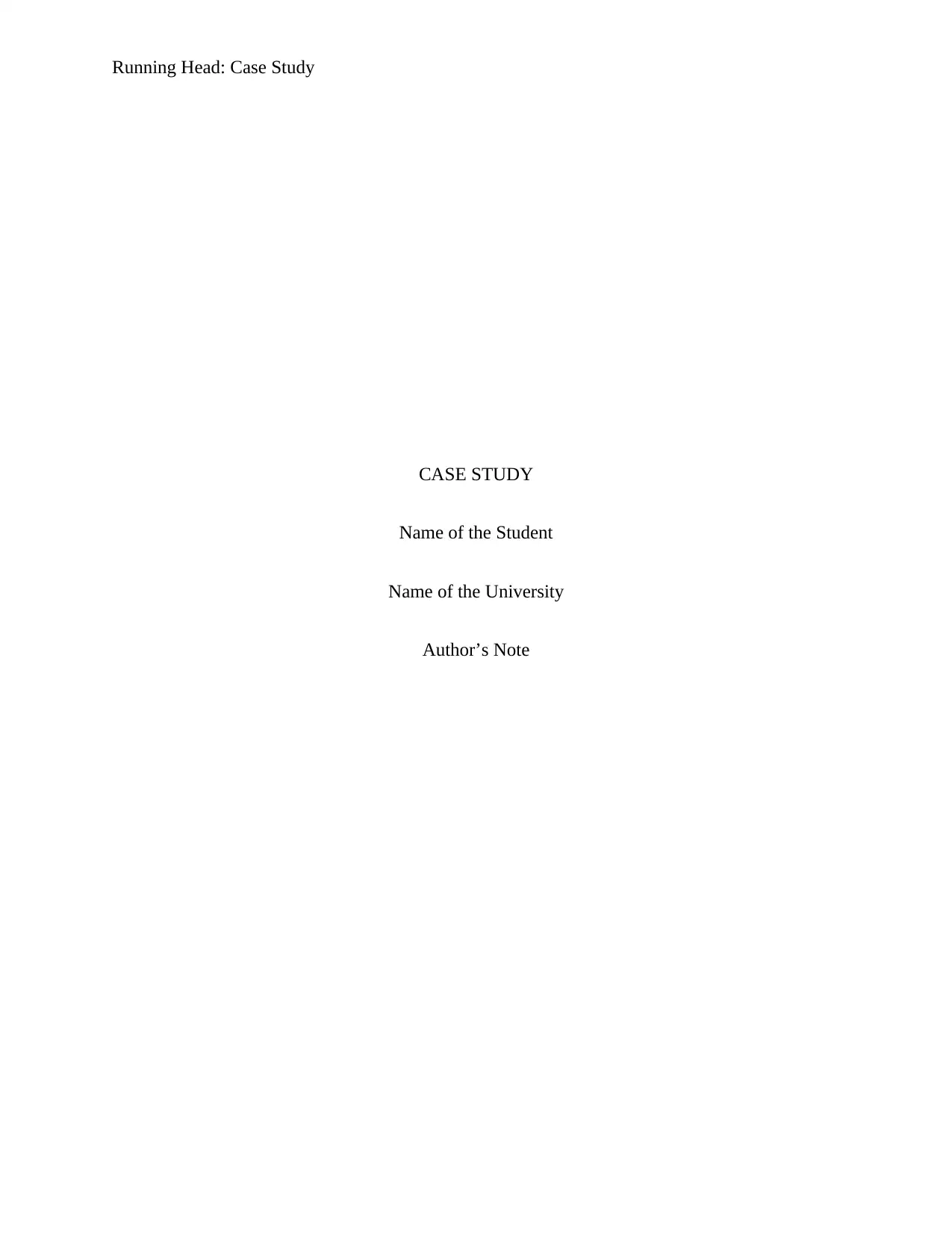
Running Head: Case Study
CASE STUDY
Name of the Student
Name of the University
Author’s Note
CASE STUDY
Name of the Student
Name of the University
Author’s Note
Secure Best Marks with AI Grader
Need help grading? Try our AI Grader for instant feedback on your assignments.
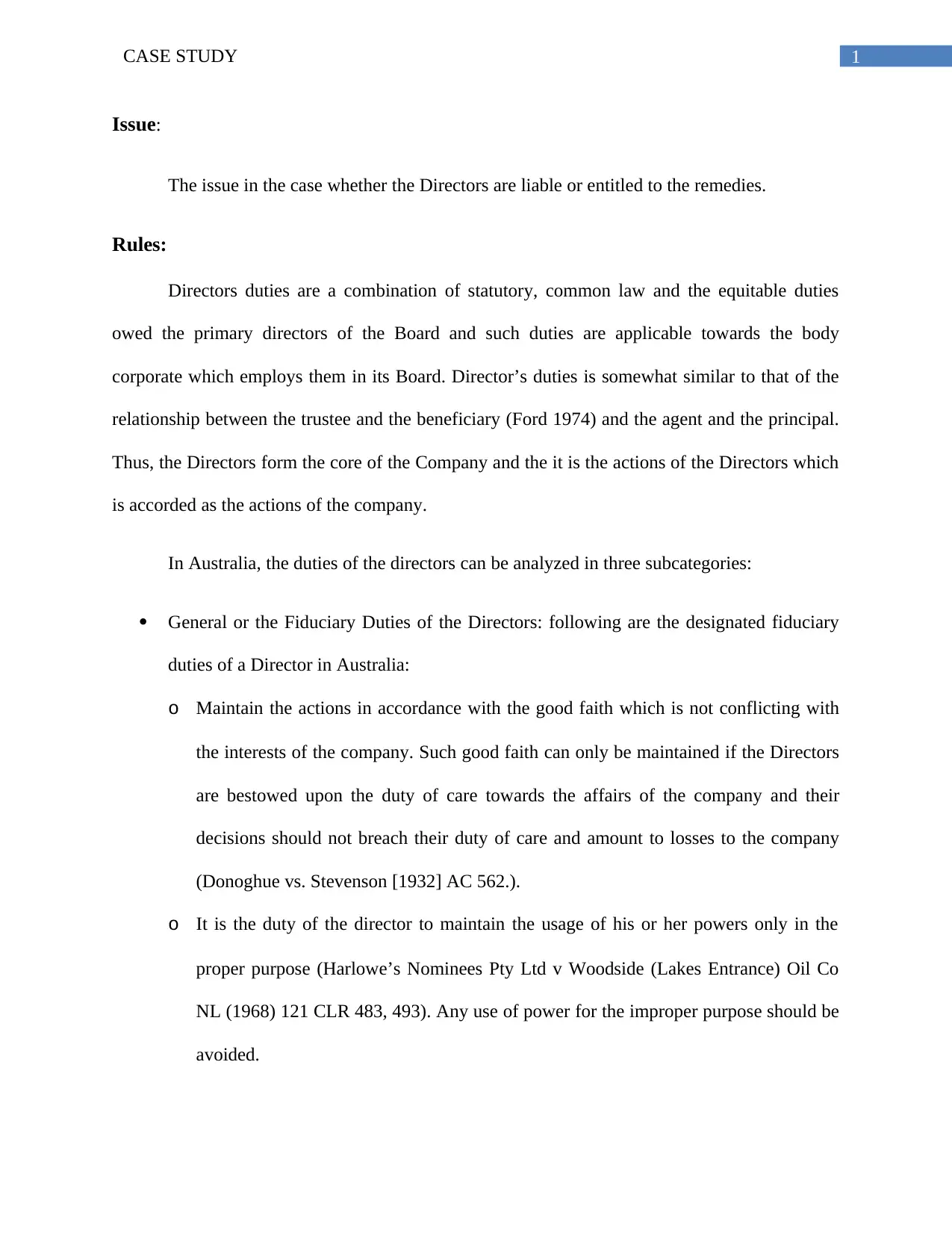
1CASE STUDY
Issue:
The issue in the case whether the Directors are liable or entitled to the remedies.
Rules:
Directors duties are a combination of statutory, common law and the equitable duties
owed the primary directors of the Board and such duties are applicable towards the body
corporate which employs them in its Board. Director’s duties is somewhat similar to that of the
relationship between the trustee and the beneficiary (Ford 1974) and the agent and the principal.
Thus, the Directors form the core of the Company and the it is the actions of the Directors which
is accorded as the actions of the company.
In Australia, the duties of the directors can be analyzed in three subcategories:
General or the Fiduciary Duties of the Directors: following are the designated fiduciary
duties of a Director in Australia:
o Maintain the actions in accordance with the good faith which is not conflicting with
the interests of the company. Such good faith can only be maintained if the Directors
are bestowed upon the duty of care towards the affairs of the company and their
decisions should not breach their duty of care and amount to losses to the company
(Donoghue vs. Stevenson [1932] AC 562.).
o It is the duty of the director to maintain the usage of his or her powers only in the
proper purpose (Harlowe’s Nominees Pty Ltd v Woodside (Lakes Entrance) Oil Co
NL (1968) 121 CLR 483, 493). Any use of power for the improper purpose should be
avoided.
Issue:
The issue in the case whether the Directors are liable or entitled to the remedies.
Rules:
Directors duties are a combination of statutory, common law and the equitable duties
owed the primary directors of the Board and such duties are applicable towards the body
corporate which employs them in its Board. Director’s duties is somewhat similar to that of the
relationship between the trustee and the beneficiary (Ford 1974) and the agent and the principal.
Thus, the Directors form the core of the Company and the it is the actions of the Directors which
is accorded as the actions of the company.
In Australia, the duties of the directors can be analyzed in three subcategories:
General or the Fiduciary Duties of the Directors: following are the designated fiduciary
duties of a Director in Australia:
o Maintain the actions in accordance with the good faith which is not conflicting with
the interests of the company. Such good faith can only be maintained if the Directors
are bestowed upon the duty of care towards the affairs of the company and their
decisions should not breach their duty of care and amount to losses to the company
(Donoghue vs. Stevenson [1932] AC 562.).
o It is the duty of the director to maintain the usage of his or her powers only in the
proper purpose (Harlowe’s Nominees Pty Ltd v Woodside (Lakes Entrance) Oil Co
NL (1968) 121 CLR 483, 493). Any use of power for the improper purpose should be
avoided.
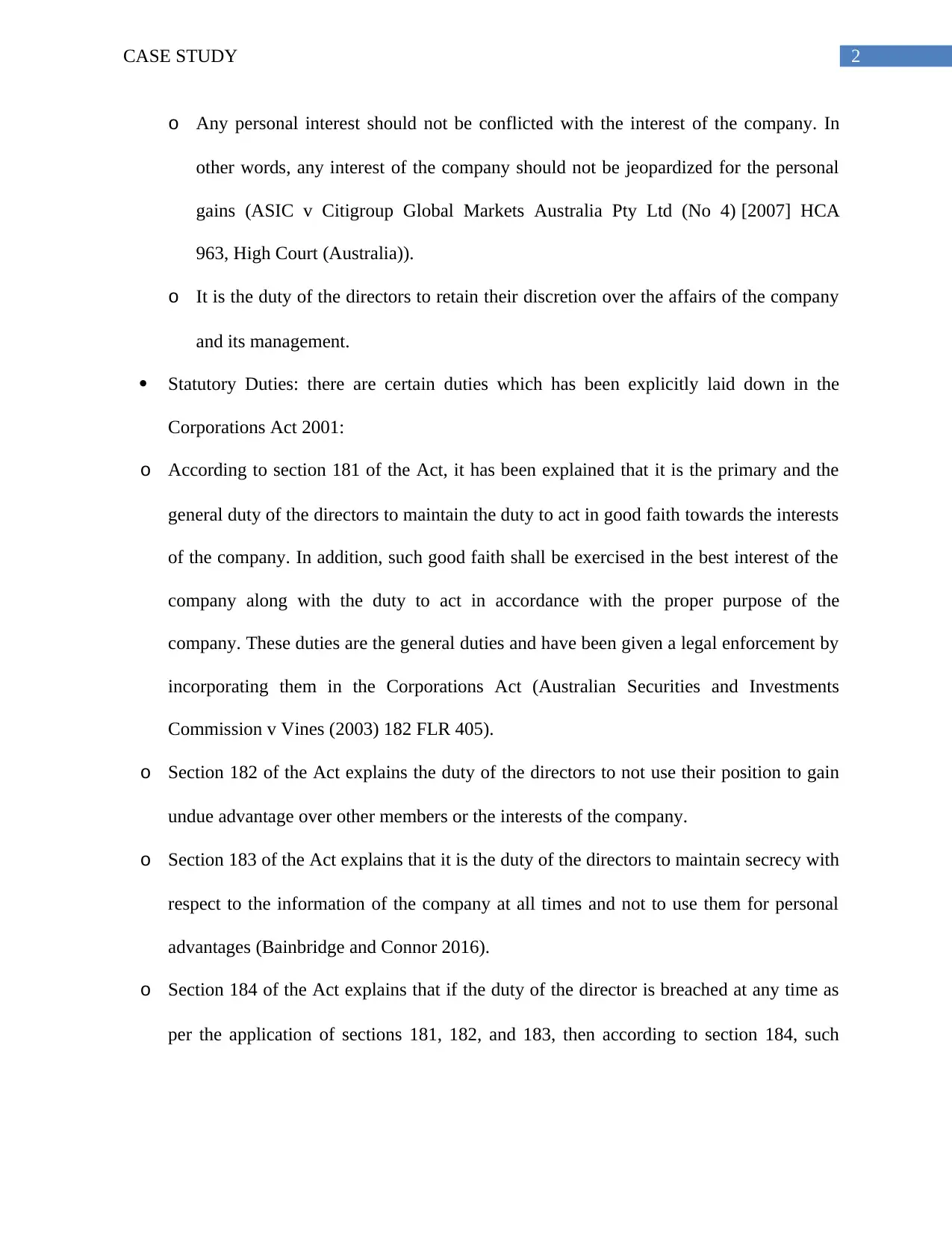
2CASE STUDY
o Any personal interest should not be conflicted with the interest of the company. In
other words, any interest of the company should not be jeopardized for the personal
gains (ASIC v Citigroup Global Markets Australia Pty Ltd (No 4) [2007] HCA
963, High Court (Australia)).
o It is the duty of the directors to retain their discretion over the affairs of the company
and its management.
Statutory Duties: there are certain duties which has been explicitly laid down in the
Corporations Act 2001:
o According to section 181 of the Act, it has been explained that it is the primary and the
general duty of the directors to maintain the duty to act in good faith towards the interests
of the company. In addition, such good faith shall be exercised in the best interest of the
company along with the duty to act in accordance with the proper purpose of the
company. These duties are the general duties and have been given a legal enforcement by
incorporating them in the Corporations Act (Australian Securities and Investments
Commission v Vines (2003) 182 FLR 405).
o Section 182 of the Act explains the duty of the directors to not use their position to gain
undue advantage over other members or the interests of the company.
o Section 183 of the Act explains that it is the duty of the directors to maintain secrecy with
respect to the information of the company at all times and not to use them for personal
advantages (Bainbridge and Connor 2016).
o Section 184 of the Act explains that if the duty of the director is breached at any time as
per the application of sections 181, 182, and 183, then according to section 184, such
o Any personal interest should not be conflicted with the interest of the company. In
other words, any interest of the company should not be jeopardized for the personal
gains (ASIC v Citigroup Global Markets Australia Pty Ltd (No 4) [2007] HCA
963, High Court (Australia)).
o It is the duty of the directors to retain their discretion over the affairs of the company
and its management.
Statutory Duties: there are certain duties which has been explicitly laid down in the
Corporations Act 2001:
o According to section 181 of the Act, it has been explained that it is the primary and the
general duty of the directors to maintain the duty to act in good faith towards the interests
of the company. In addition, such good faith shall be exercised in the best interest of the
company along with the duty to act in accordance with the proper purpose of the
company. These duties are the general duties and have been given a legal enforcement by
incorporating them in the Corporations Act (Australian Securities and Investments
Commission v Vines (2003) 182 FLR 405).
o Section 182 of the Act explains the duty of the directors to not use their position to gain
undue advantage over other members or the interests of the company.
o Section 183 of the Act explains that it is the duty of the directors to maintain secrecy with
respect to the information of the company at all times and not to use them for personal
advantages (Bainbridge and Connor 2016).
o Section 184 of the Act explains that if the duty of the director is breached at any time as
per the application of sections 181, 182, and 183, then according to section 184, such
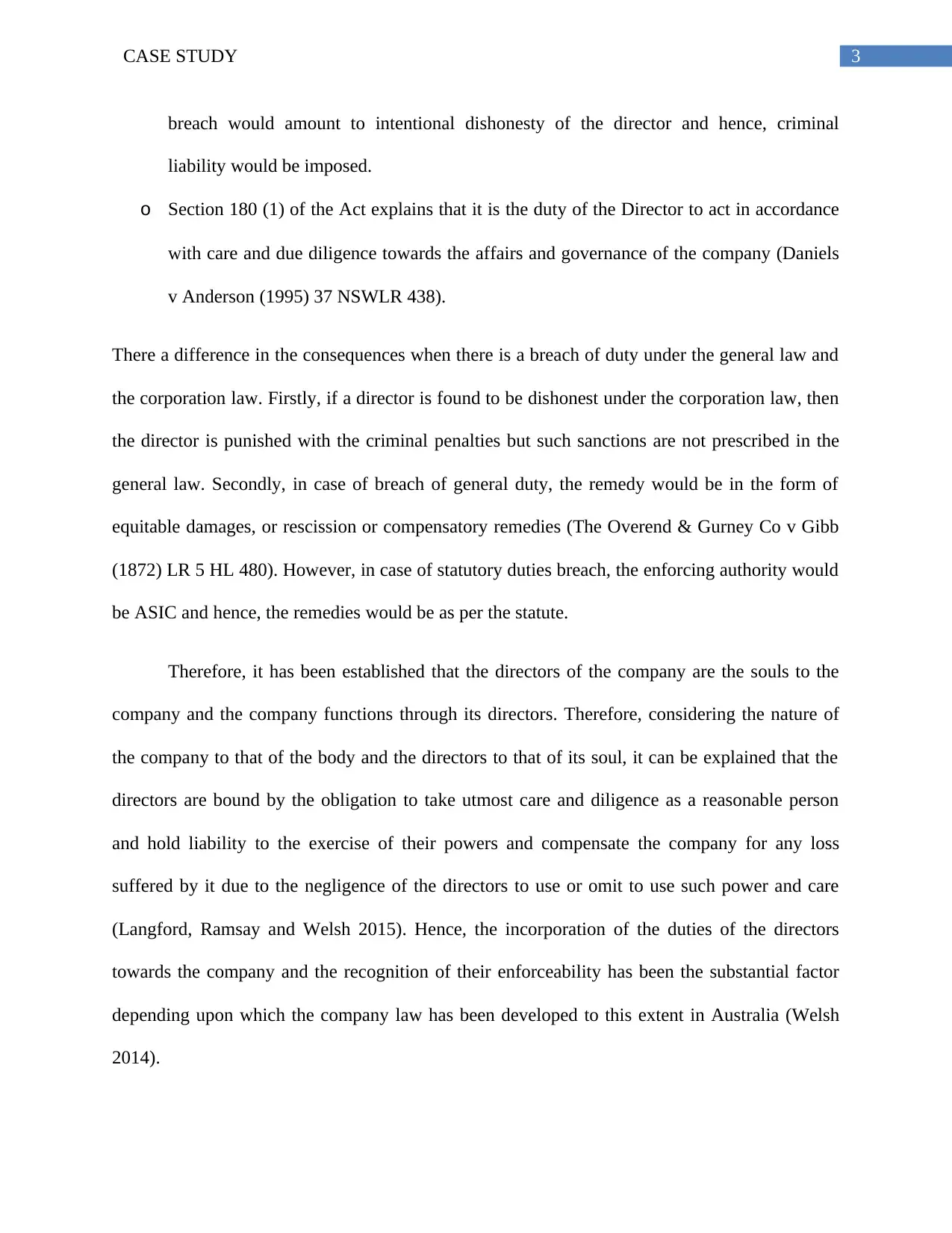
3CASE STUDY
breach would amount to intentional dishonesty of the director and hence, criminal
liability would be imposed.
o Section 180 (1) of the Act explains that it is the duty of the Director to act in accordance
with care and due diligence towards the affairs and governance of the company (Daniels
v Anderson (1995) 37 NSWLR 438).
There a difference in the consequences when there is a breach of duty under the general law and
the corporation law. Firstly, if a director is found to be dishonest under the corporation law, then
the director is punished with the criminal penalties but such sanctions are not prescribed in the
general law. Secondly, in case of breach of general duty, the remedy would be in the form of
equitable damages, or rescission or compensatory remedies (The Overend & Gurney Co v Gibb
(1872) LR 5 HL 480). However, in case of statutory duties breach, the enforcing authority would
be ASIC and hence, the remedies would be as per the statute.
Therefore, it has been established that the directors of the company are the souls to the
company and the company functions through its directors. Therefore, considering the nature of
the company to that of the body and the directors to that of its soul, it can be explained that the
directors are bound by the obligation to take utmost care and diligence as a reasonable person
and hold liability to the exercise of their powers and compensate the company for any loss
suffered by it due to the negligence of the directors to use or omit to use such power and care
(Langford, Ramsay and Welsh 2015). Hence, the incorporation of the duties of the directors
towards the company and the recognition of their enforceability has been the substantial factor
depending upon which the company law has been developed to this extent in Australia (Welsh
2014).
breach would amount to intentional dishonesty of the director and hence, criminal
liability would be imposed.
o Section 180 (1) of the Act explains that it is the duty of the Director to act in accordance
with care and due diligence towards the affairs and governance of the company (Daniels
v Anderson (1995) 37 NSWLR 438).
There a difference in the consequences when there is a breach of duty under the general law and
the corporation law. Firstly, if a director is found to be dishonest under the corporation law, then
the director is punished with the criminal penalties but such sanctions are not prescribed in the
general law. Secondly, in case of breach of general duty, the remedy would be in the form of
equitable damages, or rescission or compensatory remedies (The Overend & Gurney Co v Gibb
(1872) LR 5 HL 480). However, in case of statutory duties breach, the enforcing authority would
be ASIC and hence, the remedies would be as per the statute.
Therefore, it has been established that the directors of the company are the souls to the
company and the company functions through its directors. Therefore, considering the nature of
the company to that of the body and the directors to that of its soul, it can be explained that the
directors are bound by the obligation to take utmost care and diligence as a reasonable person
and hold liability to the exercise of their powers and compensate the company for any loss
suffered by it due to the negligence of the directors to use or omit to use such power and care
(Langford, Ramsay and Welsh 2015). Hence, the incorporation of the duties of the directors
towards the company and the recognition of their enforceability has been the substantial factor
depending upon which the company law has been developed to this extent in Australia (Welsh
2014).
Secure Best Marks with AI Grader
Need help grading? Try our AI Grader for instant feedback on your assignments.
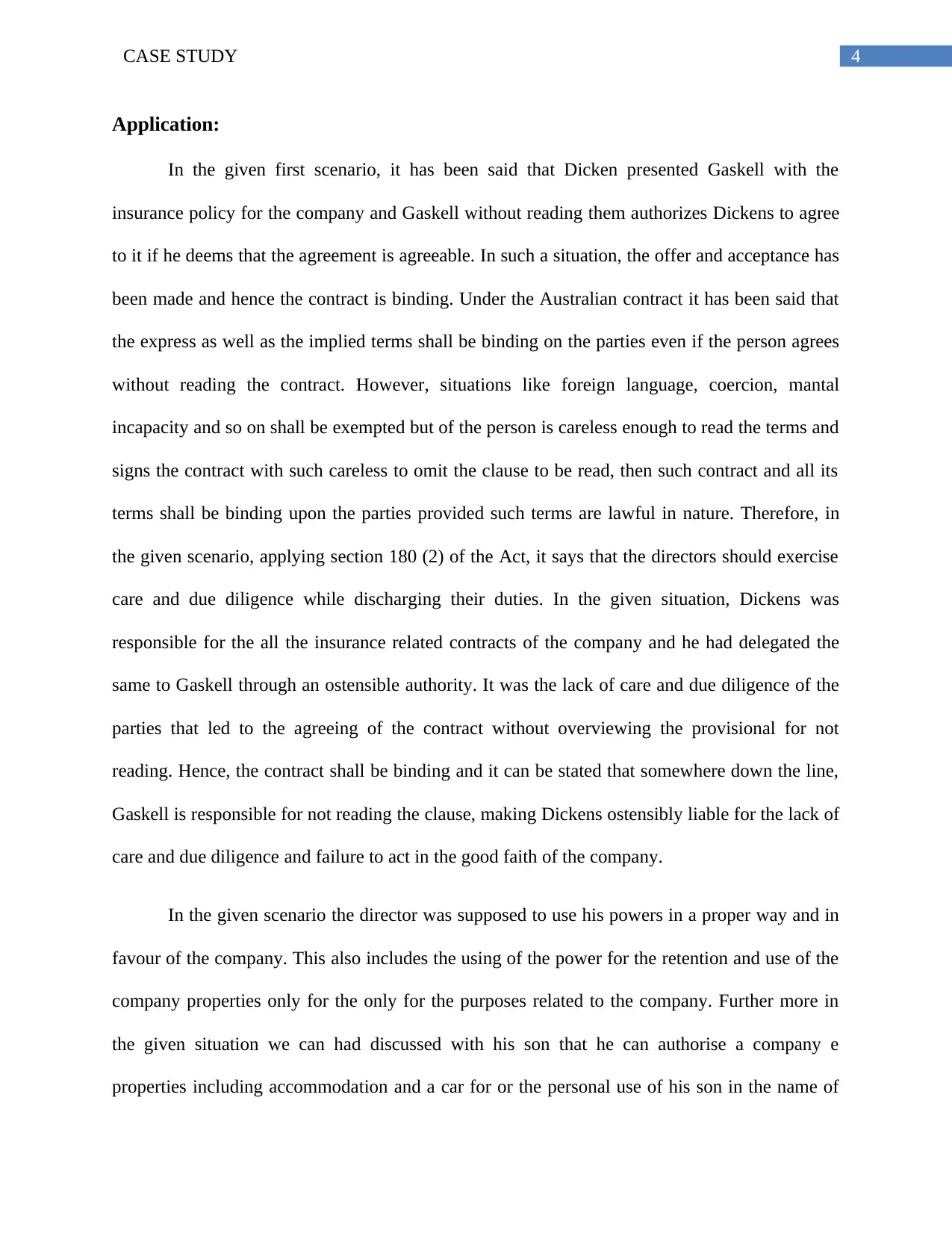
4CASE STUDY
Application:
In the given first scenario, it has been said that Dicken presented Gaskell with the
insurance policy for the company and Gaskell without reading them authorizes Dickens to agree
to it if he deems that the agreement is agreeable. In such a situation, the offer and acceptance has
been made and hence the contract is binding. Under the Australian contract it has been said that
the express as well as the implied terms shall be binding on the parties even if the person agrees
without reading the contract. However, situations like foreign language, coercion, mantal
incapacity and so on shall be exempted but of the person is careless enough to read the terms and
signs the contract with such careless to omit the clause to be read, then such contract and all its
terms shall be binding upon the parties provided such terms are lawful in nature. Therefore, in
the given scenario, applying section 180 (2) of the Act, it says that the directors should exercise
care and due diligence while discharging their duties. In the given situation, Dickens was
responsible for the all the insurance related contracts of the company and he had delegated the
same to Gaskell through an ostensible authority. It was the lack of care and due diligence of the
parties that led to the agreeing of the contract without overviewing the provisional for not
reading. Hence, the contract shall be binding and it can be stated that somewhere down the line,
Gaskell is responsible for not reading the clause, making Dickens ostensibly liable for the lack of
care and due diligence and failure to act in the good faith of the company.
In the given scenario the director was supposed to use his powers in a proper way and in
favour of the company. This also includes the using of the power for the retention and use of the
company properties only for the only for the purposes related to the company. Further more in
the given situation we can had discussed with his son that he can authorise a company e
properties including accommodation and a car for or the personal use of his son in the name of
Application:
In the given first scenario, it has been said that Dicken presented Gaskell with the
insurance policy for the company and Gaskell without reading them authorizes Dickens to agree
to it if he deems that the agreement is agreeable. In such a situation, the offer and acceptance has
been made and hence the contract is binding. Under the Australian contract it has been said that
the express as well as the implied terms shall be binding on the parties even if the person agrees
without reading the contract. However, situations like foreign language, coercion, mantal
incapacity and so on shall be exempted but of the person is careless enough to read the terms and
signs the contract with such careless to omit the clause to be read, then such contract and all its
terms shall be binding upon the parties provided such terms are lawful in nature. Therefore, in
the given scenario, applying section 180 (2) of the Act, it says that the directors should exercise
care and due diligence while discharging their duties. In the given situation, Dickens was
responsible for the all the insurance related contracts of the company and he had delegated the
same to Gaskell through an ostensible authority. It was the lack of care and due diligence of the
parties that led to the agreeing of the contract without overviewing the provisional for not
reading. Hence, the contract shall be binding and it can be stated that somewhere down the line,
Gaskell is responsible for not reading the clause, making Dickens ostensibly liable for the lack of
care and due diligence and failure to act in the good faith of the company.
In the given scenario the director was supposed to use his powers in a proper way and in
favour of the company. This also includes the using of the power for the retention and use of the
company properties only for the only for the purposes related to the company. Further more in
the given situation we can had discussed with his son that he can authorise a company e
properties including accommodation and a car for or the personal use of his son in the name of
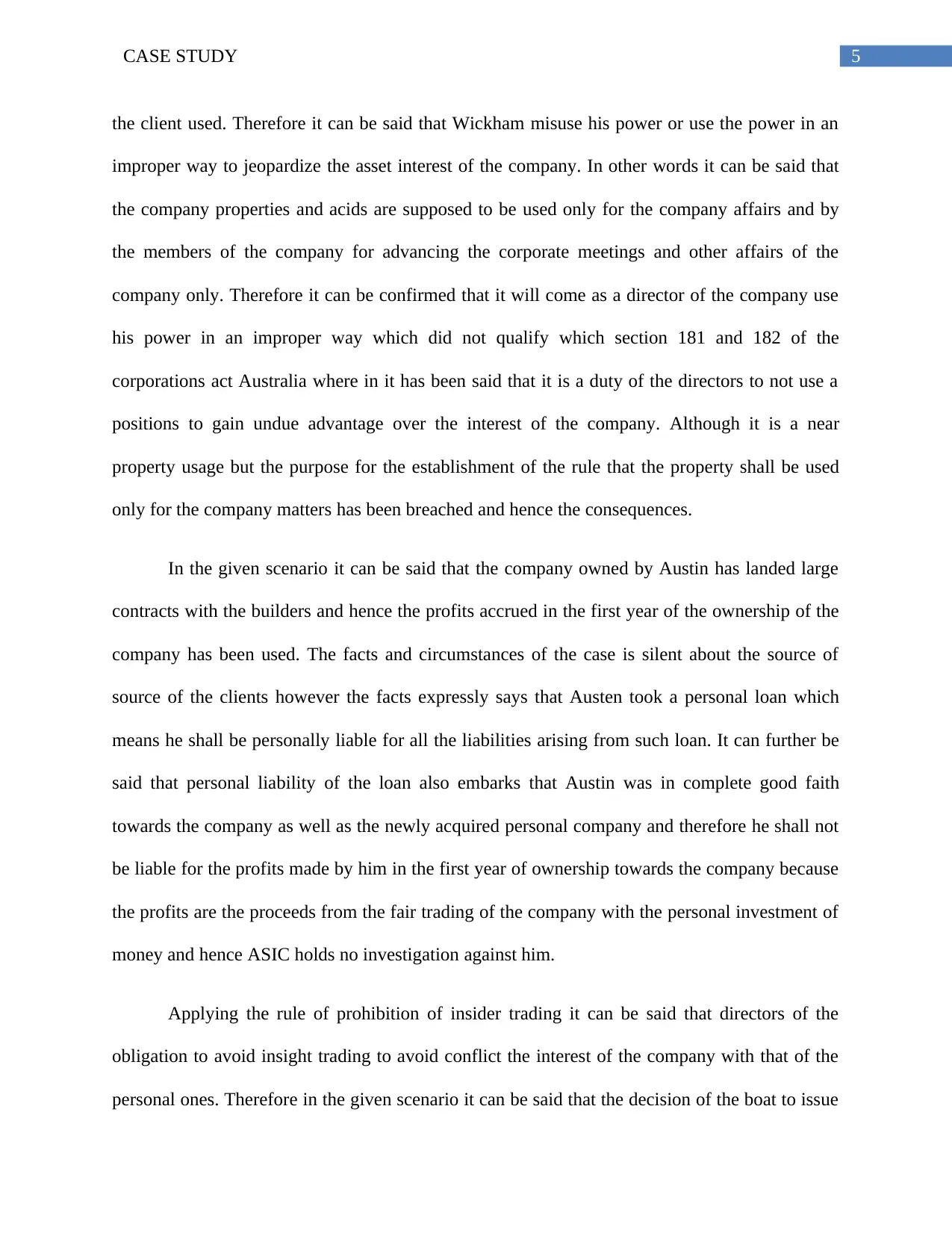
5CASE STUDY
the client used. Therefore it can be said that Wickham misuse his power or use the power in an
improper way to jeopardize the asset interest of the company. In other words it can be said that
the company properties and acids are supposed to be used only for the company affairs and by
the members of the company for advancing the corporate meetings and other affairs of the
company only. Therefore it can be confirmed that it will come as a director of the company use
his power in an improper way which did not qualify which section 181 and 182 of the
corporations act Australia where in it has been said that it is a duty of the directors to not use a
positions to gain undue advantage over the interest of the company. Although it is a near
property usage but the purpose for the establishment of the rule that the property shall be used
only for the company matters has been breached and hence the consequences.
In the given scenario it can be said that the company owned by Austin has landed large
contracts with the builders and hence the profits accrued in the first year of the ownership of the
company has been used. The facts and circumstances of the case is silent about the source of
source of the clients however the facts expressly says that Austen took a personal loan which
means he shall be personally liable for all the liabilities arising from such loan. It can further be
said that personal liability of the loan also embarks that Austin was in complete good faith
towards the company as well as the newly acquired personal company and therefore he shall not
be liable for the profits made by him in the first year of ownership towards the company because
the profits are the proceeds from the fair trading of the company with the personal investment of
money and hence ASIC holds no investigation against him.
Applying the rule of prohibition of insider trading it can be said that directors of the
obligation to avoid insight trading to avoid conflict the interest of the company with that of the
personal ones. Therefore in the given scenario it can be said that the decision of the boat to issue
the client used. Therefore it can be said that Wickham misuse his power or use the power in an
improper way to jeopardize the asset interest of the company. In other words it can be said that
the company properties and acids are supposed to be used only for the company affairs and by
the members of the company for advancing the corporate meetings and other affairs of the
company only. Therefore it can be confirmed that it will come as a director of the company use
his power in an improper way which did not qualify which section 181 and 182 of the
corporations act Australia where in it has been said that it is a duty of the directors to not use a
positions to gain undue advantage over the interest of the company. Although it is a near
property usage but the purpose for the establishment of the rule that the property shall be used
only for the company matters has been breached and hence the consequences.
In the given scenario it can be said that the company owned by Austin has landed large
contracts with the builders and hence the profits accrued in the first year of the ownership of the
company has been used. The facts and circumstances of the case is silent about the source of
source of the clients however the facts expressly says that Austen took a personal loan which
means he shall be personally liable for all the liabilities arising from such loan. It can further be
said that personal liability of the loan also embarks that Austin was in complete good faith
towards the company as well as the newly acquired personal company and therefore he shall not
be liable for the profits made by him in the first year of ownership towards the company because
the profits are the proceeds from the fair trading of the company with the personal investment of
money and hence ASIC holds no investigation against him.
Applying the rule of prohibition of insider trading it can be said that directors of the
obligation to avoid insight trading to avoid conflict the interest of the company with that of the
personal ones. Therefore in the given scenario it can be said that the decision of the boat to issue
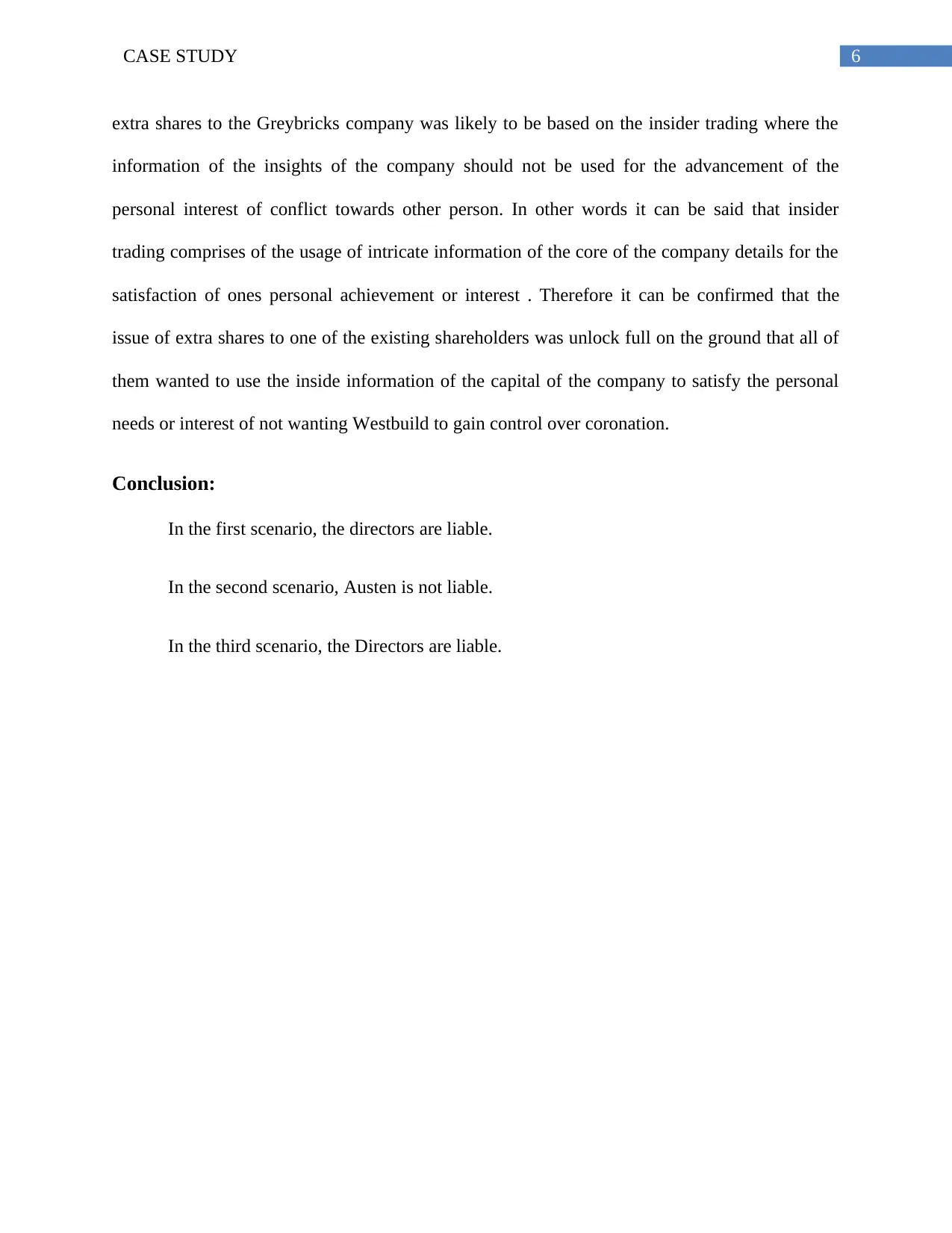
6CASE STUDY
extra shares to the Greybricks company was likely to be based on the insider trading where the
information of the insights of the company should not be used for the advancement of the
personal interest of conflict towards other person. In other words it can be said that insider
trading comprises of the usage of intricate information of the core of the company details for the
satisfaction of ones personal achievement or interest . Therefore it can be confirmed that the
issue of extra shares to one of the existing shareholders was unlock full on the ground that all of
them wanted to use the inside information of the capital of the company to satisfy the personal
needs or interest of not wanting Westbuild to gain control over coronation.
Conclusion:
In the first scenario, the directors are liable.
In the second scenario, Austen is not liable.
In the third scenario, the Directors are liable.
extra shares to the Greybricks company was likely to be based on the insider trading where the
information of the insights of the company should not be used for the advancement of the
personal interest of conflict towards other person. In other words it can be said that insider
trading comprises of the usage of intricate information of the core of the company details for the
satisfaction of ones personal achievement or interest . Therefore it can be confirmed that the
issue of extra shares to one of the existing shareholders was unlock full on the ground that all of
them wanted to use the inside information of the capital of the company to satisfy the personal
needs or interest of not wanting Westbuild to gain control over coronation.
Conclusion:
In the first scenario, the directors are liable.
In the second scenario, Austen is not liable.
In the third scenario, the Directors are liable.
Paraphrase This Document
Need a fresh take? Get an instant paraphrase of this document with our AI Paraphraser
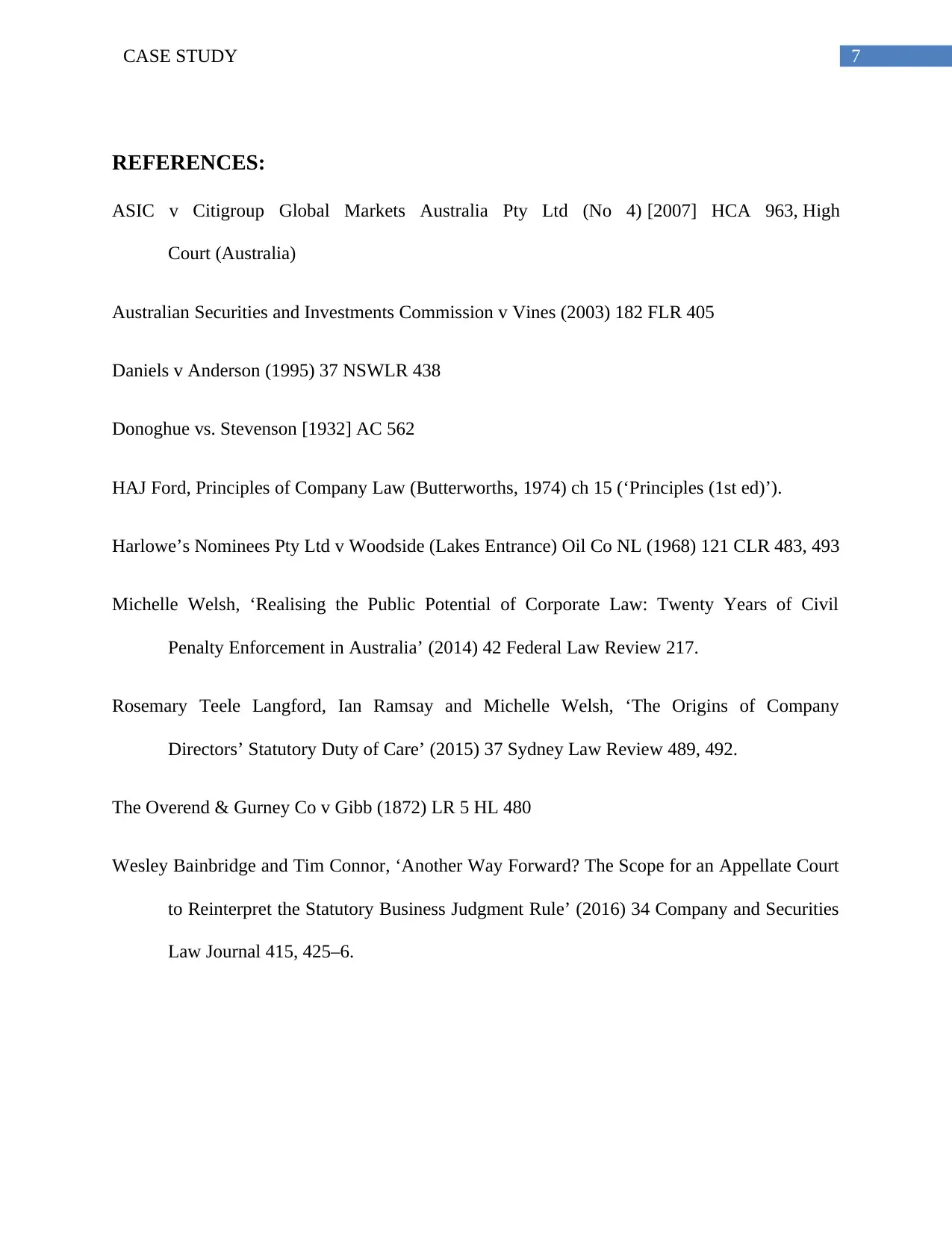
7CASE STUDY
REFERENCES:
ASIC v Citigroup Global Markets Australia Pty Ltd (No 4) [2007] HCA 963, High
Court (Australia)
Australian Securities and Investments Commission v Vines (2003) 182 FLR 405
Daniels v Anderson (1995) 37 NSWLR 438
Donoghue vs. Stevenson [1932] AC 562
HAJ Ford, Principles of Company Law (Butterworths, 1974) ch 15 (‘Principles (1st ed)’).
Harlowe’s Nominees Pty Ltd v Woodside (Lakes Entrance) Oil Co NL (1968) 121 CLR 483, 493
Michelle Welsh, ‘Realising the Public Potential of Corporate Law: Twenty Years of Civil
Penalty Enforcement in Australia’ (2014) 42 Federal Law Review 217.
Rosemary Teele Langford, Ian Ramsay and Michelle Welsh, ‘The Origins of Company
Directors’ Statutory Duty of Care’ (2015) 37 Sydney Law Review 489, 492.
The Overend & Gurney Co v Gibb (1872) LR 5 HL 480
Wesley Bainbridge and Tim Connor, ‘Another Way Forward? The Scope for an Appellate Court
to Reinterpret the Statutory Business Judgment Rule’ (2016) 34 Company and Securities
Law Journal 415, 425–6.
REFERENCES:
ASIC v Citigroup Global Markets Australia Pty Ltd (No 4) [2007] HCA 963, High
Court (Australia)
Australian Securities and Investments Commission v Vines (2003) 182 FLR 405
Daniels v Anderson (1995) 37 NSWLR 438
Donoghue vs. Stevenson [1932] AC 562
HAJ Ford, Principles of Company Law (Butterworths, 1974) ch 15 (‘Principles (1st ed)’).
Harlowe’s Nominees Pty Ltd v Woodside (Lakes Entrance) Oil Co NL (1968) 121 CLR 483, 493
Michelle Welsh, ‘Realising the Public Potential of Corporate Law: Twenty Years of Civil
Penalty Enforcement in Australia’ (2014) 42 Federal Law Review 217.
Rosemary Teele Langford, Ian Ramsay and Michelle Welsh, ‘The Origins of Company
Directors’ Statutory Duty of Care’ (2015) 37 Sydney Law Review 489, 492.
The Overend & Gurney Co v Gibb (1872) LR 5 HL 480
Wesley Bainbridge and Tim Connor, ‘Another Way Forward? The Scope for an Appellate Court
to Reinterpret the Statutory Business Judgment Rule’ (2016) 34 Company and Securities
Law Journal 415, 425–6.
1 out of 8
Related Documents
Your All-in-One AI-Powered Toolkit for Academic Success.
+13062052269
info@desklib.com
Available 24*7 on WhatsApp / Email
![[object Object]](/_next/static/media/star-bottom.7253800d.svg)
Unlock your academic potential
© 2024 | Zucol Services PVT LTD | All rights reserved.



![Groeneveld Australia Pty Ltd & Ors v Nolten & Ors (No 3) [2010] VSC 533](/_next/image/?url=https%3A%2F%2Fdesklib.com%2Fmedia%2Fimages%2Fau%2Fb2653a3887d04d8b8139875210183544.jpg&w=256&q=75)

